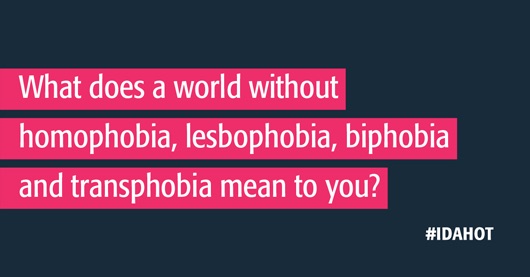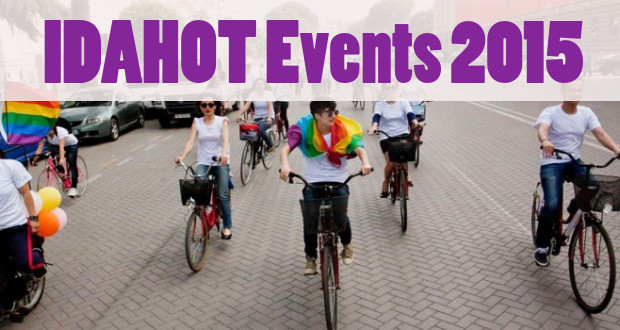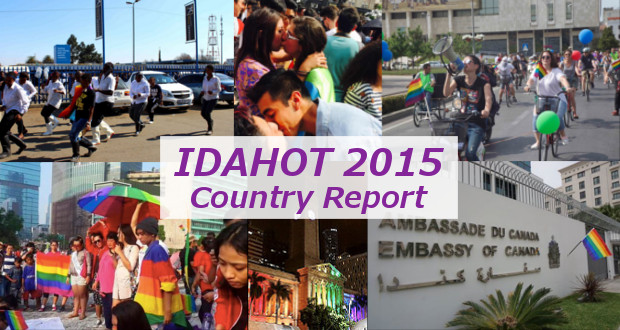Cover Image source: IGLHRC website
In commemoration of the International Day against Homophobia, Transphobia and Biphobia, the International Gay and Lesbian Human Rights Commission partners and friends to share their vision of a World without Homophobia, Lesbophobia, Transphobia and Biphobia.
May 17th marks the 11th annual International Day Against Homophobia, Transphobia and Biphobia (IDAHOT), recognized worldwide as a day to bring attention to lesbian, gay, bisexual, and transgender issues. In some places activists stage community protests and marches, some celebrate with parades and public gatherings while others of us celebrate in the safety of homes or offices, avoiding the risk of exposure.
This year, the International Gay and Lesbian Human Rights Commission asked some of our partners and friends, including Nobel Peace Prize laureate Shirin Ebadi, to tell us what a world without homophobia, lesbophobia, biphobia and transpobia means to them. How is the world different? Better?
Their responses create an inspirational picture for the future, but also underscore the damaging effect discrimination and hate have on lives of LGBT people everywhere.
Joe Wong, a trans man from Singapore told us, “A world without transphobia would mean not having to erase my past ever, allowing me to embrace every part of myself wholly. It would mean having immediate access to my loved one in case of an accident and equal opportunity to adopt and have a family, without people thinking that I’ll force my child to be queer.”
Muhammad Falak, from Pakistan, shared, “As someone who believes in Sufi Islam, I have learned that people in Pakistan are of the view that it is a homo-friendly country. On the other hand, I see no one feeling sorry or raising their voices when a transgender person is murdered. I felt sad when no one condemned two serial killers of gays who were arrested in Lahore and Faisalabad. No one openly supports or expresses their support to resolve human rights issues of the LGBT community.”
In light of this, Falak believes, “A world without homophobia, biphobia and transphobia is a world that is more accepting and inclusive. Every life is precious and cared for.”
Iranian Nobel Peace Prize laureate Shirin Ebadi told us, “A world without homophobia, biphobia, and transphobia is a place where people respect each other’s differences. Where life decisions are a private matter not judged by unconcerned others.”
Angeline Jackson, a Jamaican activist who President Obama recognized for her work, shared “Societies divided by phobias and ‘isms’ will never fully advance. The lives of those affected by homophobia, biphobia and transphobia affects all of society. A world without bi-, trans- and homophobia means a world where there is no them, it is a world of us, a world where our humanity unites us and we work together for the good of our world.”Humphrey Ndondo, from Zimbabwe, shared his vision with us in a photo, which reads: “A world without homophobia is a world where being SOOOO… GAY! Is NOT used as an insulting slur but a CELEBRATION OF DIVERSITY.”
Leigh Ann van der Merwe, a trans woman from South Africa, shared: “In a world without transphobia, I won’t have to explain what (trans)gender is. Everyone will understand gender in all its diversity beyond the binary of male and female. I will live in a world where the healthcare system offers gender responsive healthcare, and be appointed to or declined for an employment opportunity based on my competence, and not my gender identity”.
To read more of these perspectives and share the ones that you’re most inspired by, visit us on Facebook and Twitter throughout the day on May 17th. Please share, and send us a tweet or comment telling us: What does a world without homophobia, lesbophobia, biphobia and transphobia mean to you?
Our gratitude to all those who participated!
Angeline Jackson, Quality of Citizenship Jamaica
Humphrey Ndondo, Zimbabwe, Sexual Rights Centre
Joe Wong, Singapore, Asia Pacific Trans Network
Leigh Ann van der Merwe, South Africa, SHE, social, health and empowerment feminist collective of transgender and intersex women of Africa
Minhee Ryu, Korean Lawyers for Public Interest and Human Rights and Korean Society of Law and Policy on Sexual Orientation and Gender Identity
Muhammad Falak, Pakistan, Neengar Society
Natasha Jiménez, Costa Rica, Mulabi
Saghi Ghahraman, Iranian Queer Organization – IRQO
Shirin Ebadi, Iran, Nobel Peace Prize Laureate
Stone, Trans Bantu Zambia
Source of the statement from IGLHRC website.




